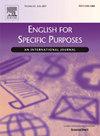diy语料库和特定学科的写作:关注语料库构建和清理的好处(在大型语言模型的时代)
IF 2.7
1区 文学
Q1 LINGUISTICS
引用次数: 0
摘要
在数据驱动学习(DDL)领域,越来越多的研究强调了为特定学科写作的教学创建小型专业DIY语料库的好处。然而,在这些研究中,语料库清理往往被描述为语料库创建过程中的一个可选步骤,并且经常被认为是一项繁琐、不必要和耗时的任务,大多数学者呼吁创建“快而脏”的语料库。在本文中,我们重新审视了针对特定学科写作的语料库创建,即语料库清理和元数据构建。更具体地说,我们的论文试图将语料库清理和元数据构建重新定义为有意义和有目的的活动,以提高学习者对学科规范和惯例的认识,特别是在比较背景下。我们的分析基于来自不同学科的学习者提供的反思,他们设计、编译、清理和分析了语料库,以及他们在中东一所教学型研究型大学的英语系为课程起草的期末论文。正如我们所希望展示的那样,语料库清理和元数据创建不仅使学科内隐形的写作惯例(包括证据和原始数据的整合)变得清晰可见,而且还将语言学习者定位为数据工程师,促进他们在大型语言模型(llm)时代对(语言)数据的作用和性质的批判意识。本文章由计算机程序翻译,如有差异,请以英文原文为准。
Do-it-yourself corpora and discipline-specific writing: A focus on the benefits of corpus building and cleaning (in the age of large language models)
Within the field of data-driven learning (DDL), an increasing number of studies have underscored the benefits of creating small specialized DIY corpora for the teaching/learning of discipline-specific writing. However, in these studies, corpus cleaning is often described as an optional step in the process of corpus creation and is frequently presented as a tedious, unnecessary, and time-consuming task, with the majority of scholars calling for the creation of “quick and dirty” corpora. In this paper, we re-examine corpus creation, namely corpus cleaning and metadata construction, for discipline-specific writing. More specifically, our paper seeks to reframe corpus cleaning and metadata construction as meaningful and purposeful activities that increase learners’ awareness of disciplinary norms and conventions, particularly in a comparative context. We base our analysis on the reflections provided by learners from various disciplines who designed, compiled, cleaned, and analyzed corpora, along with the final papers they drafted for the courses they took in the Department of English at a teaching-focused research university in the Middle East. Corpus cleaning and metadata creation, as we hope to show, not only make visible the invisible writing conventions within disciplines, including the integration of evidence and raw data, but also position language learners as data engineers, promoting their critical awareness of the role and nature of (language) data in the age of Large Language Models (LLMs).
求助全文
通过发布文献求助,成功后即可免费获取论文全文。
去求助
来源期刊

English for Specific Purposes
LINGUISTICS-
CiteScore
5.70
自引率
8.00%
发文量
41
审稿时长
62 days
期刊介绍:
English For Specific Purposes is an international peer-reviewed journal that welcomes submissions from across the world. Authors are encouraged to submit articles and research/discussion notes on topics relevant to the teaching and learning of discourse for specific communities: academic, occupational, or otherwise specialized. Topics such as the following may be treated from the perspective of English for specific purposes: second language acquisition in specialized contexts, needs assessment, curriculum development and evaluation, materials preparation, discourse analysis, descriptions of specialized varieties of English.
 求助内容:
求助内容: 应助结果提醒方式:
应助结果提醒方式:


